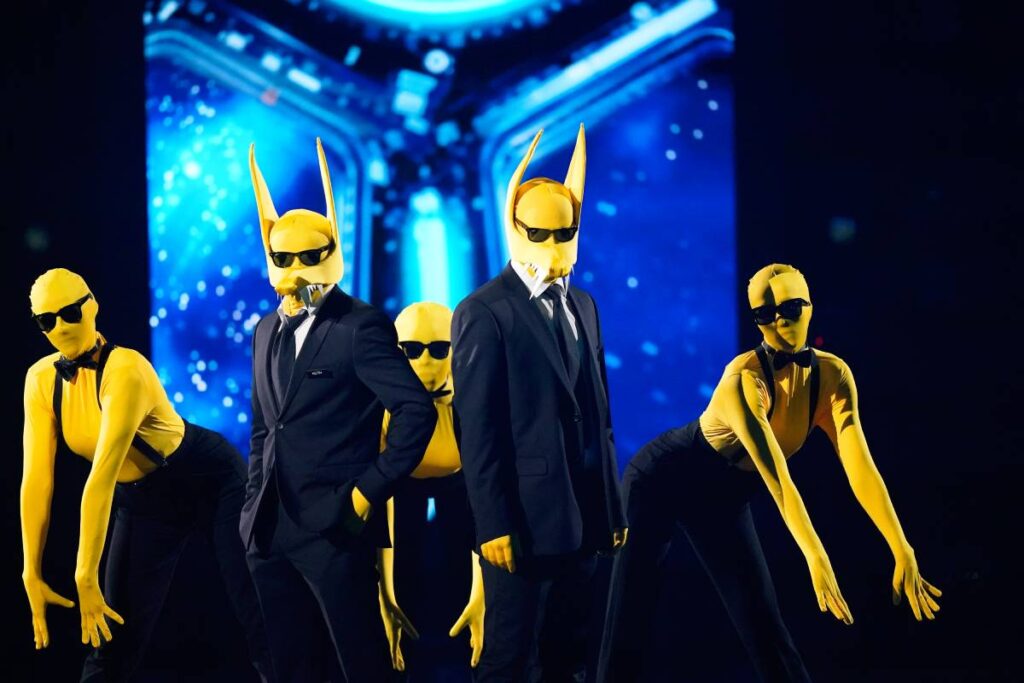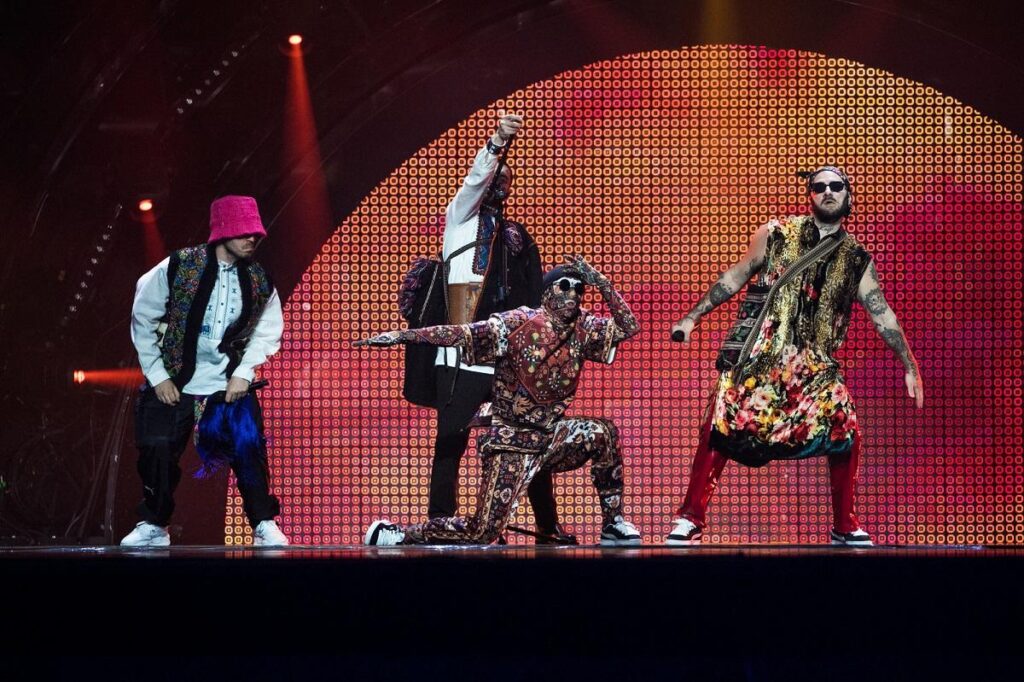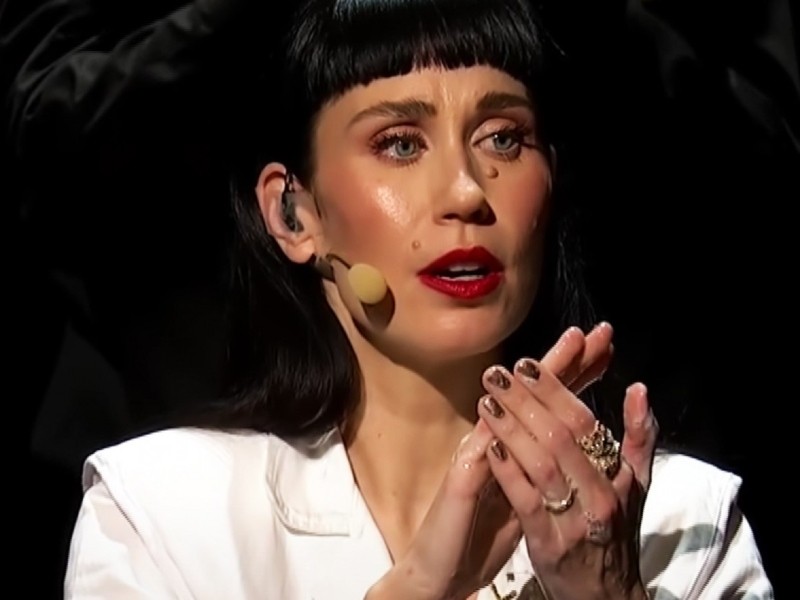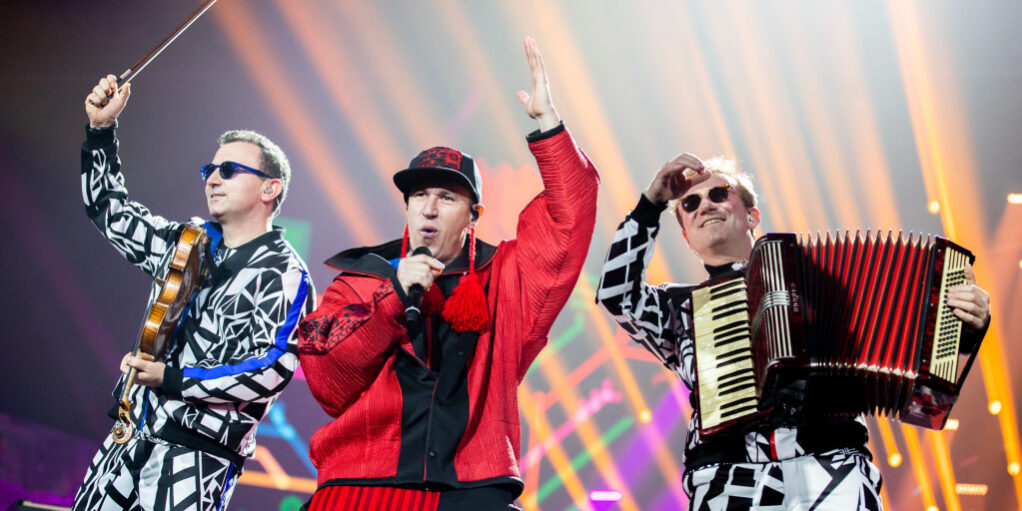Finding himself in Turin for the final, UK-based dramaturg Tommo Fowler on the theatricality of this year’s Eurovision song contest entrants.
In a year overshadowed by the tragedy of war and the grimness of pandemic, on 14th May we joined hands across the continent (and Australia) to worship together at the altar of Europop.
Eurovision rules mean that while the “Big Five” – France, Germany, Italy, Spain and United Kingdom – the group of countries who make the biggest financial contributions to the European Broadcasting Union (EBU), are guaranteed a place in the final, countries like Kosovo cannot participate as its broadcaster is not part of the EBU, and the Bosnian broadcaster is in debt to the EBU, so hasn’t participated since 2016.
A relative newcomer to Eurovision myself, having found myself in Turin during the final, and never one to shy away from a learning experience, I’ve turned my attention to the ultimate expression of continental stagecraft…
Czech Republic
This classic pop narrative sees the singer in a period of flux: she’s trying to move on after a break-up, but struggles to excise the ex-lover from her mind. She can’t stop wondering “Where are you now?”.
The cyclical nature of the process is believably drawn throughout the text: She vows that “I’ll build a fortress, I’ll be the wall” (verse), puts this distance into action by committing to “Try changing jobs, try changing lovers” (bridge), then relapses into thinking about her ex (chorus). It’s a compelling internal conflict – and feels all the more true because the writer resists an easy resolution, leaving the singer locked in her search.
The keyboardist is framed by a huge tangle of brightly coloured wires, flashing lights and flickering screens (a mix between an amp stack and surveillance control tower) – he twizzles the knobs, but it’s all facade, and nothing changes; and the beautiful marble statue in classical style, projected at the back, becomes desecrated with oozing black goo and eventually explodes, returning to dust.
Some of the lyrics could do with a bit of attention (“I’ll bring the changеs, make a plan / I’m small but mighty, yes I can” is particularly trite), but this is a stone-cold banger of 90s-infused joy, and I simply don’t care.
Romania
This seems to be about the singer running away with their lover, who society won’t accept – and this potent social conflict could certainly have been brought out more in the choreography, which forms the entirety of the staging. There’s no struggle here, with the gleefully sexy presentation at odds with the lyrics – I’d love to see a bit more narrative progression.
Also – why’s the chorus in Spanish? Perhaps the singer’s lover is from there? Projecting the lyrics so that the audience can also support the singer’s request for “mi bebé-bé” to “llamame” feels like we’re being enlisted to help with their bi-lingual love.
Portugal
I’m not that into ballads, and struggled with this this. It’s melancholic for sure – the word ‘saudade’ in the title refers to an untranslatable sense of yearning and incompleteness – but I’d love to have seen them be more theatrically inventive than just standing in a circle looking a bit glum.
Finland
I remember The Rasmus from my emo days, and I’m delighted to see that the lead singer’s still wearing those daft feathers in his hair.
Anyway, they’re back – and now with COLOUR! Exactly why they’ve picked yellow to offset the usual black is anyone’s guess: it’s the palette of the yellow jezebel butterfly, but that’s a pretty impenetrable reference if that’s what they were going for – if anything, it put me in mind of bees.
Whilst the staging – with giant black balloons – is good gothy fun, the lyrics are uninspiring and well-worn, with outdated temptress imagery that all just feels a bit like the band has spent the past ten years on 4chan. Suggest going back in the shadows for some workshopping.
Switzerland
This is a perfectly fine slow number, articulating what I think is supposed to be an important message of men embracing emotional fragility.
Equating men with planes, mountains and wolves plays into quite tired notions of big, strong masculinity, but the writer does twist them, apparently intending the audience to sense a duality – that men can be strong and vulnerable.
Unfortunately, the images are actually those of failure: “sometimes aeroplanes fall down from the sky / And mountains they crumble” isn’t so much about embracing a spectrum of possibility as pointing out rare instances of dangerous malfunction in an otherwise safe object. This analogical framework actively undermines the song’s intent, suggesting that – if anything – we should be thankful that boys don’t cry more often! Something to consider.
France
The witchy staging of this (cauldrons/fire pits, projected green flamey bits, three women) links neatly to the lyrics, which describes fire-lit women dancing with the devil in the woods.
The group formed in Brittany, and this piece reflects that: from the group’s name, which comes from the local mythological figure of a magic princess, to that spell-like chorus rooted in a traditional Breton style of singing.
Various parts of instrumentation and vocal sound, to my ear, slightly more rooted in Near- and Middle-Eastern musical styles. It makes me wonder if there’s an intended reflection on France’s colonial past. If so, that critique could be clearer.

Norway’s Subwoolfer. Photo:Terje Bendiksby
Norway
This is what Eurovision is all about: people wearing yellow cardboard wolf masks, imploring you to give them a banana.
The choreography draws heavily on ‘Thriller’, with those menacingly outstretched ‘advancing undead’ arms. But that’s juxtaposed with comedy mimes like loading a shotgun, on-the-spot running, and tottering with a walking stick – all with flashed projected text of “GRANDMA” and “YUM YUM BANANA”. Super clear narrative – great work.
And with lines like “Not sure I told you but I really like your teeth / That hairy coat of yours with nothing underneath / Not sure you have a name so I will call you Keith”, this is a delirious, utterly psychotic fever-dream of a song. No notes.
Armenia
‘Snap’ sees the singer in a bedroom with towering walls – and everything covered in little slips of white paper.
I think each of them represents one of the many songs she’s written about the person referenced – “How many last songs are left? / I’m losing count” – but it looks a bit like she’s taken up residence inside a giant piñata.
Fortunately, the thousands-of-songs idea is re-enforced visually: as she vows that this song is “the last one” she’ll write about the person she’s getting over, she rips a section of paper slips off the wall to reveal daubed black text which also says – unimaginatively – ‘The last one’. This trick is repeated with other lines, and it’s all a bit literal for my taste – and the tautology of showing and telling isn’t particularly dramatic.
The best bit, though, is the moment of the singer breaking through the wall of the set to face the audience for end of the song. In the lyrics, the singer hasn’t progressed at all, let alone burst through into an entirely new realm of freedom – but it’s a great coup de théâtre.
Italy
This duet functions brilliantly as a dialogue, with text alternately sung individually and together, sometimes taking the melody together and sometimes harmonising. It smartly represents a couple going through a tough time – on a similar path, but not experiencing it the same way.
They could do much more staging-wise, though: the entire turmoil of the text is represented by one pushing the other backwards half-heartedly and a little moment of facing off. You’ve got a home crowd, but come on guys – it’s Eurovision!
Spain
There’s no subtlety to anything in ‘SloMo’: it’s about a woman inviting someone to video her and watch it – you guessed it – in slow motion (the best way to appreciate her “booty hypnotic”, apparently).
And the staging is… basically just that! The singer is in an outrageously high-cut leotard situation wiggling around with some other extremely hot people. The gesture of the piece is ‘Spain = hot’ – and they communicate that extremely clearly.
(I wish they’d done some actual slow-mo, though, like if a Katie Mitchell production let sex be sexy rather than Problematic).
Netherlands
Google tells me the song title translates as ‘the depth’, and the singer starts surrounded by four walls made of light beams, looking a bit like she’s at the bottom of a square well – great work.
In the lyrics, the singer doesn’t want to let the song’s object go – but the beams of light angle downwards to open up the cage of light that she’s been in, suggesting release. The production is subtly nudging the audience to think that, even if the singer wants to hold on, it’s time for her to let go – and rise up from those depths.

Ukraine’s Kalush Orchestra – Eurovision 2022
Ukraine
Ukraine could’ve done basically anything this year and won the continent’s hearts – but this offering was a deserving winner.
The Kalush Orchestra’s blending of rap with folk is perfectly suited to the subject of this song, which sees an adult reflecting nostalgically about their mother. It was, in fact, written about one of the group’s actual mother – but that doesn’t stop lines like “Sing me a lullaby, mum / I want to hear your native word” and a reference to “broken roads” taking on a whole new meaning in this context.
Mother Stefania (presumably) watches over during the chorus: lightly-wrinkled eyes peer out of the darkness, projected at the back of the stage in black and white, gazing directly at the audience with a blend of care and defiance. In the dance break, the eyes give way to hands, turned inwards to surround the brightly-lit arch at the back of the stage – like they’re carefully holding a pregnant stomach – and projected on the floor, too, cupping the performers in a gesture of protection.
That monochrome takes us back to the past, which is also represented – gloriously colourfully – in the costuming: there’s a whole lot of traditional Hutsul patterning represented across waistcoats, shirts and even a taystra shoulder-bag. At one point, the group’s silhouettes are projected on the floor, filled with similar patterns: their history isn’t just a costume for tonight, but is carried within them.
All of this is juxtaposed brilliantly with the elements you’d more associate with rap: sunglasses, a bandana, and an oversized hot-pink felt bucket hat (love a strong choice).
I’ve struggled to find a good translation, so it’s difficult to unpack the lyrics properly. A reference to “[taking] two diddly-squats from her mother like they are bullets” makes me wonder if there’s an attempt also to problematise any uncritical romanticising of the past, but I’m not sure.
It doesn’t hugely matter, though: as Putin’s genocide attempts to wipe out the very culture and identity of Ukraine, to have this song celebrated across Europe is more potent than anyone could’ve imagined when it was written
Germany
A fairly saccharine bit of crooning about wanting to be a rock-star is cleverly paired with the singer stalking around a load of abandoned instruments – a full rock-band set-up – to highlight his yearning. Also a clever touch to have him stop at some of the instruments and apparently record a loop of a melody to continue playing – it’s like he’s constructing the whole song by himself. It wasn’t much fun, but it was a super clean, well-thought-through bit of stagecraft.
Lithuania
A real retro feel to this one, with the singer’s shiny bowl hair-cut, smoky eyes and sequinned halter-neck mixing with close backing harmonies and strings. But I couldn’t detect much relationship between the song, performance or staging.
Azerbaijan
A nice ballad about lost love, and the “numb” feeling of the aftermath. The over-sized set of stairs that the singer performs on make him look like child-like and vulnerable, and the choice to have a dancer interpreting the emotion of the song gives brings welcome texture to the stage picture.
I also thought it was smart to have the stairs split in half, with the singer on one and the dancer marooned on the other – it’s like the singer’s dissociating from himself, with his feeling placed outside of his body (linking back to the chorus of “numb”).
Belgium
Another Backstreet Boys-esque offering – or maybe more like N*Sync, with these Timberlake vocals – and the staging pretty much just extends to a guy singing on his own about a break-up in a metallic silver jacket. Perhaps his backing dancers (comparatively shadowy figures, all in black) hint at the “past” the singer has “been trying to escape”. They’re often looming behind him, anyway.
Greece
I’ll be honest, I thought ‘Die Together’ was going to be a bland bit of Twilight -infused teen angst – but the stage-craft totally elevates it.
The light and dark of the staging reflects the contrasts in the lyrics: “It’s been a lovely year” is followed by “It’s been a hell of a year”, and the idea of dying to stay together and save a relationship is all kinds of contradictory.
It’s set on what looks like a shadowy graveyard of upturned chairs – some half-submerged into the stage – as if we’re looking at the aftermath of a big old argument. In the middle is the singer, dazzling in a bright white jumpsuit that’s both silky and plasticky – she’s like a corpse-bride, the costume somewhere between a shroud and a body-bag. The aesthetic is nicely haunting, and absolutely suits the lyrics.
Iceland
The song has a retro Western feel, and that’s reflected in the Americana aesthetic of the costumes: cowboy hats, tassels sleeve, boots.
The lyrics are about finding positivity in the fact that, even in Iceland’s long, dark winters, the sun will still rise again – and the warm, hazy lighting definitely picks out this idea. It’s simple, but sumptuous.
The group’s wish, they say, is that these lyrics will speak to Iceland’s most marginalised – to let people, and especially trans youth, know that there’s always hope – and their sweet, sunny song should do just that.
Moldova
Like Ukraine, Moldova is blending genres old and new – this time folk and rock’n’roll. Imagine if you walked into a pub in a down-on-its-luck rural Moldovan town, to discover an unemployed Fred Durst, in the midst of a hyperactive rant about taking a train. That’s basically the lead singer.
My initial thought is: why’s he singing about trains when everyone else is singing about break-ups?
Turns out this is the opposite of a break-up song: it’s a getting back together song. And not romantically, either – this is a song about the desire for reunification.
Yes, this frenetic romp of song is actually disguising strong political intent – and just as well, because the Eurovision rules state that it’s “a non-political event” which “shall in no case be politicized and/or instrumentalized”.
The train they’re singing about is the Chișinău-Bucharest line, connecting the Moldovan and Romanian capitals – and the first verse is so clear in its critique of the separation of Moldova and Romania as countries that I’m amazed it was allowed.
The train’s going, just like flying
From one country to another
It is going but confused:
What’s the country? Are they fused?
Is it old or is it new?
Seems like one, but also two
Both together and apart
Are there two, or just one?
The choice of perspective is genius – how can the song be political when the character is just a train who’s not sure where it is? But this is exactly the point of art: to be super fun, super subversive, and get a message out past the censors. And, in this case, it’s one that’ll piss off Putin as well. Glorious.
Sweden
I wasn’t that impressed by this offering, but I think they might just have been screwed over by the producers.
That big semi-circle upstage, which looks a bit like a vinyl record, is in fact a much-trailed set-piece called the ‘kinetic sun’: a series of luminescent, interlocking arches designed rotate independently, and which acts built their staging concepts around. Except that technical issues in fact rendered it almost useless, so it was abandoned.
Presumably as a last-minute replacement, the singer instead performs in front of a flimsy little circular screen, which unfortunately is as anticlimactic as miniature Stone Henge in Spinal Tap and – for a song that bangs on about the sunrise – is weirdly lit alternately in bright green and red.
Am I missed a deep metaphor about envy/anger? Christmas? Traffic lights? Who knows. Song’s good, though!
Australia
The singer has a fab outfit, looking like an ancient god behind a jewel-encrusted veil-and-tiara situation, and with a flowing white feathery train over a ballooning pure-white suit and heels. Best costume of the evening.
The veil is something the singer has worn before, apparently to put the focus on his voice – but, crucially, it can be taken off dramatically at an appropriate point in the song: it’s a simple, effective way to illustrate the idea of wanting to “hide the break inside”, but help others who feel like him by showing “that the light shines bright”. The performance massively elevates some occasionally anodyne lyrics about not fitting in.
The staging is really smart. A couple of staircases meeting at a V-shaped point initially suggest only two paths which lead to the same destination anyway – but then they move, becoming an Escher-like confusion of possibility. The intention is clear: the world isn’t binary, but full of potential for alternative modes of living.
United Kingdom
The song is about wanting to get up into space (man), to be free of heartbreak and instead float among the stars – and the stage concept follows that journey really concisely.
The singer begins in a glowing white fractal cage-like structure echoing a rocket, then the cage turns orange and opens up like it’s breaking apart as it speeds through the atmosphere, and then finally he’s all alone surrounded by beautiful twinkly lights. Great!
Could do more to tell the story in his performance, though: Sam looks like he’s having the absolute best time rather than battling heartbreak – and who can blame him when he gets to wear a super-glam black one-piece bejewelled with gorgeous astral patterns?
Poland
Okay so this is pretty bleak: it’s a man wanting to drown himself for “all that I’ve done”. The song doesn’t say exactly that might’ve entailed, but there’s definitely something about power here: “Who’d wanna be a king / Pulling too many strings”. Read your own politics into it, because this song eschews any clear moral question.
The staging is full of water imagery – finally, the set’s fountain has come into its own! – and we’re treated to some really shonky rain-drops overlayed on the TV footage. Would suggest cutting that: there’s a river projected on stage, guys, we get it.
There’s also some faceless river-wraith things who creep their way onto the stage and then fling themselves about like haunted seaweed – they look like they’ll drag him down, but he defeats them through the power of song. Nice one, you crazed autocrat.

Konstraka performing In Corpore Sano
Serbia
There’s just so much here – definitely the piece closest to political performance art this year, so naturally I loved it.
We start with a woman on a chair, seated in front of an enamel bowl in which she’s washing her hands over and over. She’s clearly seen the Covid posters – great technique – and there’s shades of Lady Macbeth too.
But this imagery isn’t about a person’s killing the (head of) state, it’s about the state killing its people – in this case, through their refusal to provide healthcare. The artist without insurance – just like anyone else who isn’t rich – had better make sure they’re washing their hands bloody well.
Money, and the aspirational ‘wellness’ culture it enables, permeates the song: the first verse, like so many ‘women’s mags’, wonders what the “secret” might be behind Meghan Markle’s “healthy hair”. The politics of Black women’s hair aside, the critique is clear: beauty tips that pretend to help you access a celebrity-level of health, just like the importance of “counting our steps” whilst walking the dog, are are deadly distraction from the urgent need for the state to care for its citizens.
The singer is flanked by a circle of solemn-looking people in black robes – they look like priests, but the white collars of their outfits turn out to be towels: these guys will either dry your hands or administer last rites, and it’s a super powerful combination of ideas.
Projected behind them all are repeated images of hands washing themselves, over a stark black and white grid, as if showing us that they’re just computer generated – the manufactured appearance of health. At other times, a beautiful pink flower is shown in the same way – a spinning replica of the flower that’s pinned over the singer’s heart. It’s like it says, ‘Don’t think about vital organs, look at this pretty thing!’
There’s genius, too, in starting the song with an inversion of the Latin phrase meaning ‘A sick mind in a healthy body’: spoken backwards, it suggests that the mind (of the artist?) may be healthy, but the body-politic is diseased.
I could go on about this for ages – we haven’t even discussed the highly meme-able synchronised clapping! – but suffice to say that this song, its staging, and its relationship to the performance context, are all just sensationally well-constructed.
Estonia
The Western-infused style means it doesn’t feel especially European (apparently singer Stefan is influenced by Johnny Cash and the soundtracks to spaghetti westerns), although at least the flight through a desert landscape that’s projected on the back was filmed in Spain – and the costuming is like contemporary cowboy meets euro-glam, with a nice rhinestone-studded jacket.
Not much narrative, here – the singer just bounds around looking happy and studiously not playing his guitar (Chekhov would hate Eurovision) – but it’s nice to end with an anthemic sing-along chorus, and a room full of Europeans chanting “I hope” together is, I’ve got to say, pretty damn beautiful.
Further reading: Duška Radosavljević Krojer deconstructs the music and imagery Konstrakta
.
Tommo is a Sheffield-based dramaturg for text and production. He’s Residencies Dramaturg and a Supported Artist at Sheffield Theatres, co-founder of award-winning dramaturgy company RoughHewn, and a board member of the Dramaturgs’ Network.








